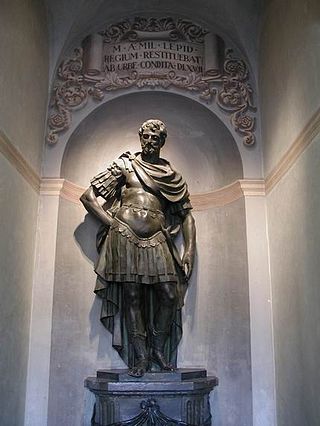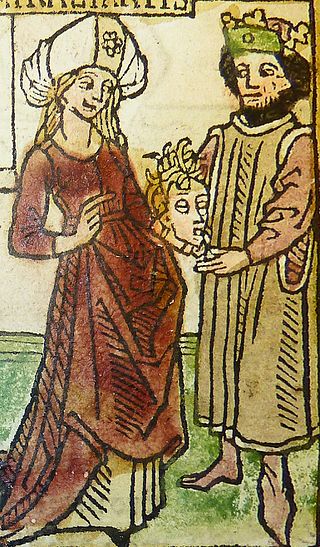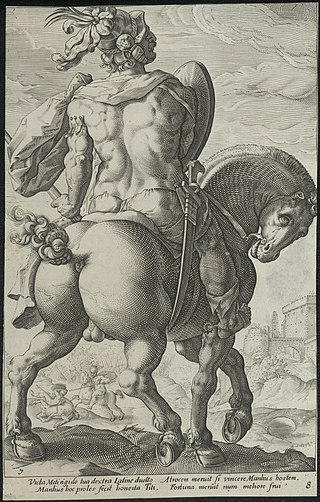Year 189 BC was a year of the pre-Julian Roman calendar. At the time it was known as the Year of the Consulship of Nobilior and Vulso. The denomination 189 BC for this year has been used since the early medieval period, when the Anno Domini calendar era became the prevalent method in Europe for naming years.

The gens Manlia was one of the oldest and noblest patrician houses at Rome, from the earliest days of the Republic until imperial times. The first of the gens to obtain the consulship was Gnaeus Manlius Cincinnatus, consul in 480 BC, and for nearly five centuries its members frequently held the most important magistracies. Many of them were distinguished statesmen and generals, and a number of prominent individuals under the Empire claimed the illustrious Manlii among their ancestors.
Titus Manlius Torquatus may refer to four Roman Republican consuls of the gens Manlia:

Marcus Aemilius Lepidus was a Roman consul, Pontifex Maximus, Censor and Princeps Senatus. A scion of the ancient Patrician gens Aemilia, he was most likely the son of Marcus Aemilius Lepidus, with his brothers being Lucius and Quintus.
Gnaeus, also spelled Cnaeus, was a Roman praenomen derived from the Latin naevus, a birthmark. It was a common name borne by many individuals throughout Roman history, including:

Chiomara was a Galatian noblewoman and the wife of Orgiagon, chieftain of the Tectosagi, one of three Galatian tribes during the Galatian War with Rome, of 189 BC.

Titus Manlius Imperiosus Torquatus was a famous politician and general of the Roman Republic, of the old gens Manlia. He had an outstanding career, being consul three times, in 347, 344, and 340 BC, and dictator three times, in 353, 349, and 320 BC. He was one of the early heroes of the Republic, alongside Cincinnatus, Cornelius Cossus, Furius Camillus, and Valerius Corvus. As a young military tribune, he defeated a huge Gaul in a duel in one of the most famous duels of the Republic, which earned him the epithet Torquatus after the torc he took from the Gaul's body. He was also known for his moral virtues, especially his severity as he had his own son executed for disobeying orders in a battle. His life was seen as a model for his descendants, who tried to emulate his heroic deeds, even centuries after his death.
Titus Manlius T.f. Torquatus was a patrician Roman Republican consul for 299 BC, elected along with a plebeian co-consul Marcus Fulvius Cn.f. Paetinus.

The Galatian War was a war between the Galatian Gauls and the Roman Republic supported by their allies Pergamum in 189 BC. The war was fought in Galatia in central Asia Minor, in present-day Turkey.

The Battle of Mount Olympus was fought in 189 BC between the Galatian Gauls of Asia Minor and an alliance consisting of the Roman Republic and Pergamum. The battle ended in a crushing allied victory. Livy is the main source for this battle, and his description can be found in book 38, chapters 17–23.
Lucius Manlius Acidinus Fulvianus was an ancient Roman nobiles, originally born to Quintus Fulvius Flaccus, who had been consul four times, but was adopted into the Manlia gens, probably by Lucius Manlius Acidinus.
Gnaeus Manlius Cincinnatus was the first of the patrician gens Manlia to obtain the consulship, which he held in 480 BC, together with Marcus Fabius Vibulanus. His father's name was Publius.
Gnaeus Manlius Vulso was Roman consul in 474 BC with Lucius Furius Medullinus Fusus.

Publius Manlius Vulso was a member of the Roman patrician gens Manlia. In 210 BC he was praetor of Sardinia.
The gens Maenia, occasionally written Mainia, was a plebeian family at ancient Rome. Members of this gens are first mentioned soon after the establishment of the Republic, and occur in history down to the second century BC. Several of them held the position of tribune of the plebs, from which they strenuously advocated on behalf of their order. The most illustrious of the family was Gaius Maenius, consul in 338 BC, and dictator in both 320 and 314. In some manuscripts, the nomen Maenius appears to have been erroneously substituted for Menenius or Manlius; there are also instances of confusion with Manilius, Maelius, and Maevius.
Aulus Manlius Vulso was a Roman politician in the 5th century BC, and was a member of the first college of the decemviri in 451 BC. In 474 BC, he may have been elected consul with Lucius Furius Medullinus. Whether or not the decemvir is the same man as the consul of 474 BC remains unknown.
Marcus Manlius Vulso was a consular tribune of the Roman Republic in 420 BC.
Aulus Manlius Vulso Capitolinus was a consular tribune of the Roman Republic in 405, 402 and 397 BC.
Aulus Manlius Vulso was a Roman senator. From 194 to 192 BC, he was a member of a board assigned to colonize the area around Thurii and Castrum Frentinum. He may have served as suffect praetor in 189 BC and was elected consul in 178 BC.
Manlius Torquatus may refer to one of the following individuals from Roman gens Manlia:





